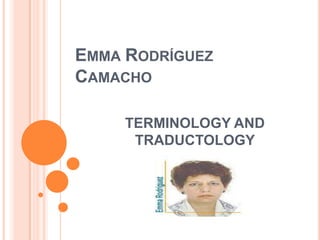Emma rodriguez camacho
- 1. EMMA RODRÃGUEZ CAMACHO TERMINOLOGY AND TRADUCTOLOGY
- 2. BIOGRAPHY ïĒ She is M.A. in Applied Linguistics at the University of Paris. In addition she is a professor of translation at the foreign languages âdepartment of the school of language sciences. She has been in charge of the course of terminology in the translation program specialization. She was part of the Thematic Network Aleterm, for the training in terminology in Spanish University of Malaga, Salamanca and Pompeu Fabra in Barcelona.
- 3. TRASLATION STUDIES ïĒ The concept of translation can be approached from two perspectives: ïĒ The Discipline, called traductology, which deals with the methodical, systematic and plurisdiciplinary study of the theoretical aspects, descriptive and methodological of translation. ïĒ The practice, understood as the interlingual transfer operation that is to interpret the meaning of a source text to produce a target text, seeking to establish an equivalence relation between both, according to the inherent parameters in a situation of communication.
- 4. WHAT WAS HER REASON TO START STUDYING TERMINOLOGY? ïĒ She was a professor of terminology course in the specialization program in translation and at the moment of design it she always had the same question: ïĒ What terminology training requires a student to address the translation of specialized texts?
- 5. SHE ESTABLISHES A RELATIONSHIP BETWEEN TRASLATION AND TRADUCTOLOGY ïĒ Three considerations oriented her reflection: ïĒ One scientific, related to the translation process and its implications. ïĒ The second, practical, related to the management of terminological problems to perform an specialized translation. ïĒ Third, related to the impact of new information technologies in the process, related to translation.
- 6. SOME STATEMENTS âĶ. ïĒ Translation problems are not exclusively about linguistics, that you can solve with the simple search of equivalence. ïĒ Working with two languages âmeans that words do not exactly correspond from one language to another, since their reality and context is different. ïĒ Much of the translation errors are due to ignorance of the subject, motivated by the fact of not having enough terminology information, which is the one that allow you to find out the conceptual organization of a topic.
- 7. A TERMINOLOGY TRAINING FOR TRANSLATING SPECIALIZED TEXTS SHOULD BE CONSIDERED THE DEVELOPMENT OF BASIC SKILLS ïĒ Cognitive Competence: Relates to the knowledge of the subject matter of translation. ïĒ Language Proficiency: Related to the knowledge of the two languages âpresent in the translation and appropriate forms of expression to produce the translated text. ïĒ Methodological Competence: To perform a systematic and orderly work.
- 8. TERMINOLOGY TRAINING FOR THE TRANSLATION OF TEXTS, ALLOW THE TRANSLATOR ïĒ To be able to understand the scientific-technical texts: That means to assimilate its conceptual organization through schemes and own forms of expression. ïĒ To be able of reasoning in a logical way: This helps to capture the relationships between different concepts. ïĒ To be able to identify and characterize different types and genres of text. ïĒ To be able to identify and interpret the source terminology and know how to work with it for translation by the adequate location and utilization of the appropriate documentation.
- 9. THANK YOU VERY MUCH !!! Daniela Ramos GÃģmez









